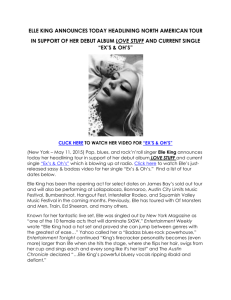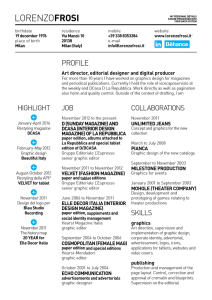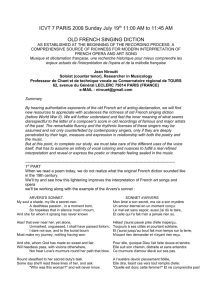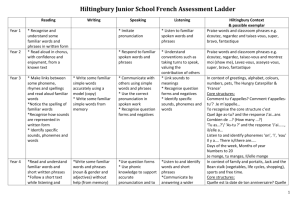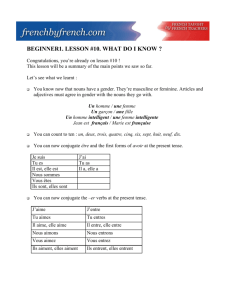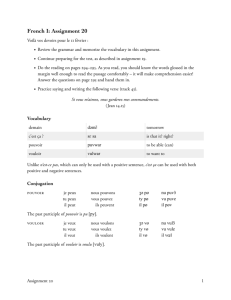Elizabeth Griffis Psyc 3200 Dr. Kohn My Virtual Child Assignment
advertisement
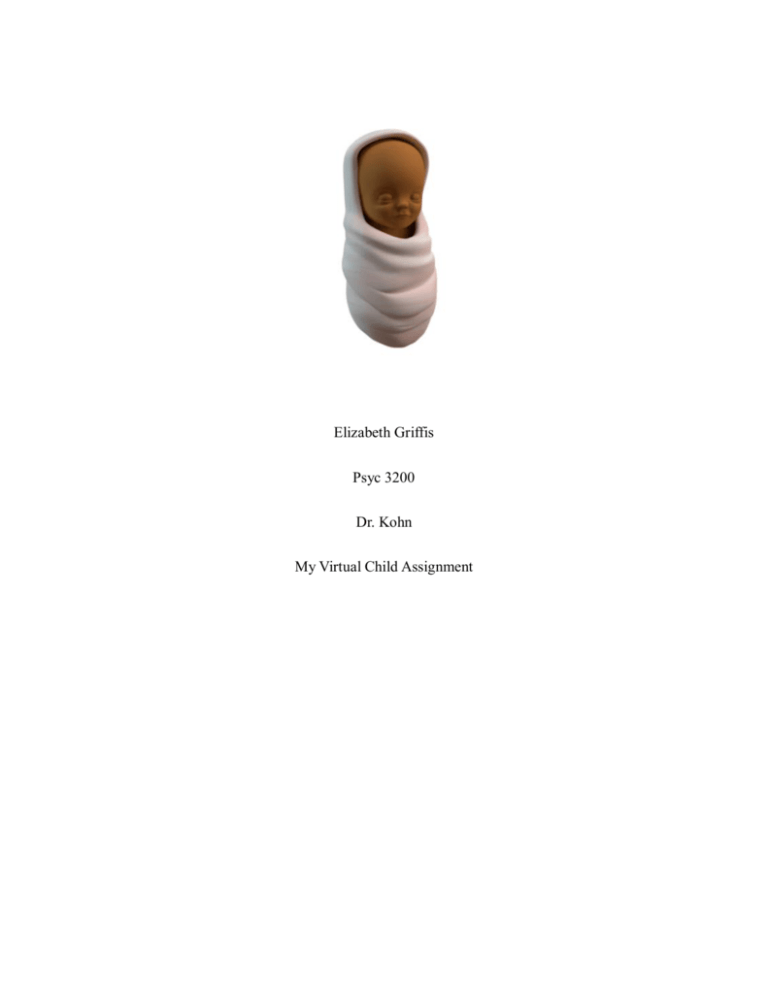
Elizabeth Griffis Psyc 3200 Dr. Kohn My Virtual Child Assignment Component 1: Developmental Progress (9-12 Months) Elle’s behavior from what she has portrayed, is very normal for an infant at 9-12 months old. As she turns 9 months old, the pediatrician believed she was mostly very good according to the Bayley Scales of Infant Intelligence. When I take Elle to new situations and new people, I try to encourage reactions with the new people such as her being held by others, or putting her on the floor to enjoy play time with other babies or adults. However, I tried not to shove her on to others in case it might start to stunt her social abilities. Although she shows a tendency for me, my partner Zach insists on showing her as much affection, which I hope also increases her want to socialize as she ages. On the physical exam that is based on the Bayley Scales of Infant Intelligence, Elle has mild to positive reactions with most people and situations (at least in the office and play room). I believe I might have babied her a tad bit, because she seems to have a problem with unlatching herself to me. She does however, enjoy making eye contact and smiling at new people. She makes vocal sounds (although we’re not sure what “boogaberta” and “gobblegurry” are we assume they’re good things) when seeing them and she seems well on her way at 9 months. Elle at 8 months continues to grow; she learned nonverbal cues over the past few months and has learned to make gestures (which is thankfully a norm; I didn’t want her developing at too fast a rate). I tried giving her what she wanted, but felt like she was too dependable. Rather than shoving her into the deep end of a pool however, I slowly weaned her onto the idea of calling out a word to get what she wanted. When she wants a bottle of milk, rather than her pointing at the bottle, I sound out the word “milk” and repeat it a few times until she made a strong attempt to try and say the word milk. When she aged to around 12 months old, a friend of mine from Beijing, China came to visit my household and introduced Elle to the foreign language that is Chinese. Although I’m Korean and not Chinese, I did actually take several courses in Chinese and realized that introducing foreign language early would probably increase Elle’s abilities. Zach and I believed that being cultured would really provide a solid foundation for her future, so we wanted her to try it out. She attempts it (although she sounds hysterically American) and really enjoys the sounds her own voice makes. Elle at twelve months also knows several words and can understand what an item is (sometimes) and pronounce it clearly. For instance, when the tea kettle starts to whistle and she hears it, she will shout “Tea! Tea!” She is developing very well! Elle’s food and eating habits at 9 months are a bit slow, however. We’ve only been using milk formula, milk, and baby food on her; I am always slightly worried if we start to move up to bigger, realer foods, it may affect her in a negative way. The pediatrician, however, qualmed my fears and told me I could begin to start grinding up the food from the family dinner with Zach. I decided to start small and grind unsalted vegetables like beans and lettuce. Sometimes I would also provide a desert of ground up strawberries or bananas! At 9-12 months, Elle continues to stay in good health, which I believe is from her good health habits! She hasn’t had any colds or fevers so I have decided to keep her on this diet for a little while. When introducing new foods (such as foods that are foreign but healthy such as bok choy) Elle generally has a positive reaction and tolerates changes as a whole well. As for her motor skills, the pediatrician believes at 9 months old she is well advanced in her gross and fine motor skills. We really like that she is mobile and that she really enjoys crawling and even finds new ways to stand up! She often uses the coffee table as a brace for standing, and she really enjoys the object permanence tests that we “play.” Elle at first, can find the item after repeatedly putting it in the same spot. When we move it however, she does sometimes have a hard time finding it at 8 to 9 months old. When she is around 12 months old though, she really enjoys exploring and moving around. I often would take her for a stroll outside and speak to her pointing out various items to hopefully increase two skills at one time. Rather than helping Elle along with new words and actions however (since she seemed highly advanced for a 12 month old), I taught her to start learning how to drink milk from a cup without spilling out, and turning pages in her favorite book Green Eggs, and Ham! She also likes learning how to properly use a spoon, although she does like flinging the food in her face from time to time. Since Elle learned to walk earlier than usual, she has already learned to climb which in turn makes her… dangerous to her own good. If Elle does bad things she shouldn’t, I try to discipline her by saying a loud “No!” if she somehow gets on top of the couch by climbing the back of it and I put her in time out to let her understand what she had done wrong. Overall, Elle is developing well, with no deficiencies and no problems. She does however become a little too attached to me, but I believe the problem will fix itself over time. Component 2: Developmental Progress: 19-24 Months At 8 months, Elle did play with the pink ball and did not quite understand where it went after moving it to another place. According to Piaget, this occurs all the time in children at her age. Like Piaget’s belief, Elle at 12 months also enjoys walking outside and trying to understand what snails are or birds are. She likes to enjoy her environment and according the Piaget’s sensorimotor stage belief, she is a very normal child. At 8-12 months, Piaget states that the child wants to coordinate vision and hand eye coordination. Likewise, Elle at 15 months enjoys playing with the flashing baby walker that has plenty of visual and touching items to play with. Elle is progressing well and learns how to climb and walk a little too early. Elle had to be told several times “No!” if she climbed things she shouldn’t have. Although I encourage her exploratory behavior, too much exploring could end up in a huge problem later. Likewise, Piaget still continues to describe the ideals and system that is Elle. At 18 months, Elle is in the tertiary sub-stage of the sensorimotor stage. She experimented with new behavior on several occasions; one being a dirt mount and water. Elle built a mound of dirt outside and she decidedly poured water over it and enjoyed how the dirt crumbled into nothing but nasty mud. Piaget the child as a young scientist, and Elle definitely portrays the belief that things should be mixed together! I introduced Elle to very rudimentary cake baking, and I asked her to help me pour eggs, milk, and oil onto flour. She reacted in such a positive way that later in the day she decided to do the exact thing with dirt and water. Elle’s learning abilities and how she processes information can also follow the Information Processing Theories as well however. At 8 months old, Elle is introduced to a variety of things including new interactions with others. Elle’s mind is like a computer and processes the information and ideal that people seem to be inherently good, and therefore Elle’s mind believes she can smile and create new interactions with others. When she communicates at 8 months, she learns that she can use her hands and her voice to get what she wants rather than simply just crying. This works for her and it helps her overcome her obstacles when she wants a bottle of milk or juice and doesn’t know how to use it with words. Elle also uses her skills from past and present situations to do and evaluate future and current obstacles. When Elle is re-introduced to the object permanence test and the pink ball, she understands that every time the ball moves, so does its hiding place. She can find the ball instantly and easily. Even when my partner Zach and I would use a different item and hide it in different, but obvious places (such as the ball under a blanket) she can easily spot the item after several minutes elapse. When Elle overhears our problems and situations when we argue, Elle adapts to the sound and becomes very similar to us, becoming and adapting to what she believes true people should be. Elle seems much more intelligent and seems to understand that we’re arguing over things like household duties, but she seems to have such a strong affection for both of us she perhaps becomes frustrated that she doesn’t know how to fix the problem. Elle however, does know how to manipulate and stack blocks of hers showing that she is exploring the concept of building and destroying; she is very interested in that concept but I usually let her choose what other things she wants to explore if she gets too bored of her building blocks. Elle also learns how to process other information by growing plants around the house with me at 18 months old. She learns that the plants need sun and water and enjoys basking in the sunlight as much as the plant does! She understands the concept of the plant needing nutrients because she understands that she herself needs food and water! Component 3: Developmental Progress: Main ages are 24 months to 3 years I believe Elle’s behavior is very much influenced by her environmental events in her life. When Elle is introduced to my family and friends, I try to make her comfortable but I also encourage interaction and “conversation” (at 8 months she didn’t really have many words to say…) with them. At 8 months, I didn’t want to overwhelm her though. I only let her do what she really wanted to do. At 2 years old, although Elle is hesitant at her daycare to speak with others and her peers. Once she got used to them however, Elle became friends and she learned that by imitating each other, she could enjoy her friends more. Elle sometimes does have problems with her socializing skills, however. I believe Elle, like myself as a child, is a little too excited to have friends in school and thus loves to talk to them even when they should be napping or sleeping. Elle at three is a little rambunctious but I don’t feel like she’s doing much too wrong. I enjoy that she is developing much more sociably than I did as a child. When Elle socializes and imitates others, she is one step closer to becoming and understanding what she is as a child. By letting her do this, I believe it has influenced her to become a more sociable person as opposed to a shy child in her later years. I believe that several experiences like time spent with Elle really does influence her future actions or the way she acts normally in situations. At three, I had had another child Julia, and Elle was truly excited to have a new sister. I believe from what Elle has seen with the way I had treated her and her meeting other families and other parents with kids, she has already learned how to nurture and take care of a child. When Julia was born, Elle learns how to rock and feed her. Elle sometimes regresses to being a young infant like Julia, but she once again I feel is really doing well with learning how to imitate actions from others and learning what is and isn’t appropriate. Elle also has learned at three what she likes and dislikes. Although I have a very strong interest in music and this could have perhaps influenced Elle because I listen to it so much (I would play Disney songs or very G-rated songs around her of course!), I believe Elle is developing her own tastes and attributes of things she likes. Since Elle is in preschool at age 3, she really enjoys singing the songs she learns from school. I would often hear her singing about the wheels on the bus when she comes home. She dances very well for her age and enjoys any type of music. She even enjoys the music I listen to that I used to listen to when I was younger! Elle is becoming more and more similar to me and I really like the way she is becoming more and more like a mini adult. Elle learns what she likes from the many things she is introduced in preschool like her favorite color to seeing dogs in the park. I really believe that by letting her choose what she likes and what she doesn’t like, it provides future healthy behaviors and gives her more of an interest in having a healthy physical behavior. If I can keep her dancing or get her into playing an instrument, I believe she will be very well off in her future. Component 4: Nature and Nurture My favorite thing about Elle is probably her ability to speak to others and to understand what they are feeling. Although I would have liked that Elle was more resilient and less over controlled (my fault of course), Elle’s ability to speak in social situations and her kindness really makes me feel like a proud virtual parent. From the day she uttered her first word (8 months), Elle has begun her path of speech and understanding rather quickly. Although she is shy to others and hesitant at first, Elle in pre-school at 3 really warms up to others when she realizes they are safe. Elle really enjoys being with her friends and really likes her teacher as well. I really like that although Elle is only 3, she realizes who she can trust and perhaps who she should not trust and is hesitant to speak to others. If she stays this way in her personality, I can trust Elle to go on her own and not be in danger. I can give Elle more independence when she gets older if she becomes slightly suspicious but mostly hesitant to know someone. I feel like this social trait is both a genetic and a nurturing gene. As a adolescent up to now, I have always been suspicious and hesitant of others, but I am very talkative like Elle is and I enjoy the company of others once I get to know them. Perhaps though, Elle could be imitating my personality as a whole rather than she being genetically pre-disposed to do the things that I do. Elle also has several emotional outbursts and tantrums at age 3. I remember as a child that I would also throw tantrums and be angered very easily. I don’t believe that I’ve given Elle anything to be angry out nor have I showed her any anger so I believe she did not imitate this from me, and rather this was a genetic trait. Although tantruming is never really appropriate, Elle really likes to show out at our favorite restaurant, Ruby Tuesdays. When she does this, I have to put her out of the situation and calm her. I hope that she doesn’t tantrum from my nurture, and rather it be a fact of nature that I can fix. I think Elle does struggle with some social situations however. Although I do like that she is hesitant, I don’t really like that she needs a little bit more “push” to enjoy the presence of others as a child. Elle often has a problem with standing up for herself and as a child I feel like I didn’t have that problem. When I was younger, I never really came off as shy or a push-over; I usually ran the school yard. It might be that since I raised Elle to stay by me often, she is much shyer and doesn’t like to be the leader of a group. I don’t believe my genes influenced this, and if anything it could be a chance of random events. For instance, Elle’s assessment from the developmental specialist at 3 years old says that Elle is hesitant in many situations (like getting into a group to color “in the lines”) and only has a few friends at school. Although she is doing well in school and is doing above average in all of her skills, I feel I want Elle to be a little friendlier with her school mates. Since then, I’ve been trying to give Elle social cues about it being OK to talk to strangers her age, as long as she feels she is not doing anything dangerous. If she does end up doing something dangerous or doing something bad, I like to put her into time out or discipline her to make sure she doesn’t do it again. Elle usually if not always listens to me after this, and only makes the mistake of being loud in a restaurant once or twice more. I hope I can develop her social skills better but I also hope that I am not raising her so harshly that she feels like she must defy what I tell her to do and not to do.

